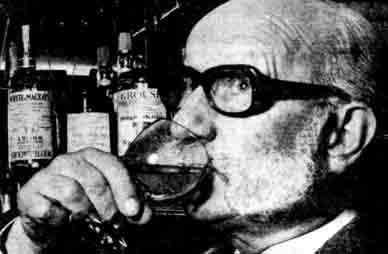The Cost of Whisky 1976.
It's a grim outlook for the man who like a dram!
In the NEWS 1976...

A night at your local could soon mean a trip down memory lane, a trip back to wartime when you had to queue for whisky.
Those who have heard of rationing only in the nostalgia ramblings of their elders might, in five years be faced with a whisky shortage. The scarcity could be brought about by the financial crisis currently hitting a trade which pours £1m. duty into the Chancellor's coffers every day.
And the crisis could be worsened next month if Chancellor Healy slaps an extra 65p duty on each bottle, as many MPs and whisky executives fear he will.
TROUBLE IN THE PUBS...
Apart from the immediate effect of adding 3p to the cost of a dram, the increase will almost certainly cause a further drop in production and threaten many of the Scotch whisky industry's 20,000 jobs.
Already distilleries are being forced to cut back or cease production altogether because of the crippling level of duty which currently stands at £2.70 on a £3.40 bottle.
The effect of the cuts will not be immediately obvious, say the experts in the trade, but will show in about five years' time when whisky, produced this year, is mature and ready for off licences and pub gantries. Faced with the cash crisis, threatened redundancies, and the future shortage, trade bosses and MPs have risen in anger at the suggestion of another increase in duty.
"A 65p increase allied with the 64p put on at the last Budget would do inestimable damage to the export and employment prospects of the industry." Scottish Nationalist MP Douglas Crawford told the Commons this week.
Mr Crawford, who has two major whisky firms in his Perth and East Perthshire constituency, was so alarmed at the rumoured increase that he wrote to Chancellor Denis Healey pleading with him to relax his attitude to the industry.
"The consumer and the whisky trade are being bled dry by Governments who consider whisky a bottomless cash box. Government actions will create chaos in the industry in a very short time."
WARNINGS OF A SHORTAGE
"I've pointed out in my letter that Mr Healey could kill the goose that lays golden eggs. An increase now would be a hammer blow. Few people nowadays can afford to pay almost 30p for a small whisky."
He is backed by whisky executives who warn that the Government's hard line will lead to a serious shortage by 1980 with drinkers queuing up to pay sky-high prices for a dram.
They claim Mr Healey could immediately ease the situation by allowing distilleries time to pay duty. Under present regulations the duty must be paid as soon as whisky leaves the bonded warehouse.
Firms then have to wait perhaps 10 weeks until the whisky is sold over the counter before they get their money back. "The running cost of this is in the region of Executives have continually pleaded with the Government to allow them the same concession given to brewers who have a 40 day credit period which allows them time to sell the beer before having to pay duty.
Hottest critics of the Government's attitude is Mr Adam Bergius chairman of the Information and Development Committee of the Scotch Whisky Association.
He claims the "ineptitude and greed" of Governments is to blame for the industry's lack of finance. "By 1980 world consumption will have risen by 60 per cent, to an estimated 190,000,000 proof gallons, but the industry simply cannot afford to lay down stocks to cope with that sort of demand.
"It is hard to accept that a Government will make life so difficult for an industry which is one of the country's largest export earners.
"The Government gives handouts to other industries, but we are not even asking for that. All we want is to be allowed to use our own money to prevent a serious shortage at the end of this decade.
Mounting pressure will be put on the Government before the Budget on April 6, but MPs are not hopeful of changing the Chancellor's mind if he has already decided on the increase.
LOOK AT HOW THE PRICE HAS ROCKETED...
Her's proof of the way the drinker has had to pay more and more for a dram. This table charts the rise in whisky prices, and duty, from 1918 until 1975.
Year 1918...Cost 9/- (45p) Duty 3/6 (17.5p)
Year 1919...Cost 10/6 (52.5p) Duty 5/10 (30p)
Year 1920...Cost 12/6 (62.5p) Duty 8/5.5 (42.5p)
Year 1939...Cost 14/3 (71p) Duty 9/7.5 (48p)
Year 1940...Cost 16/- (80p) Duty 11/4.5 (57p)
Year 1942...Cost 23/- (1.15) Duty 16/0.5 (80p)
Year 1943...Cost 25/9 (£1.28) Duty 18/4.5 (92p)
Year 1947...Cost 31/- (£1.55) Duty 22/3.5 (£1.11)
Year 1948...Cost 33/4 (£1.66) Duty 24/7 (£1.22.5)
Year 1961...Cost 41/6 (£2.07.5) Duty 27/- (£1.35)
Year 1964...Cost 44/6 (£2.22.5) Duty 30/- (£1.50)
Year 1965...Cost 48/6 (£2.42.5) Duty 34/- (£1.70)
Year 1966...Cost 51/11 (£2.60) Duty 37/6 (£1.87.5)
Year 1968...Cost 58/5 (£2.90.5) Duty 44/- (£2.20)
Year 1973...Cost £2.75 Duty £2.42
Year 1975...Cost £3.50 Duty £2.78.
End.
